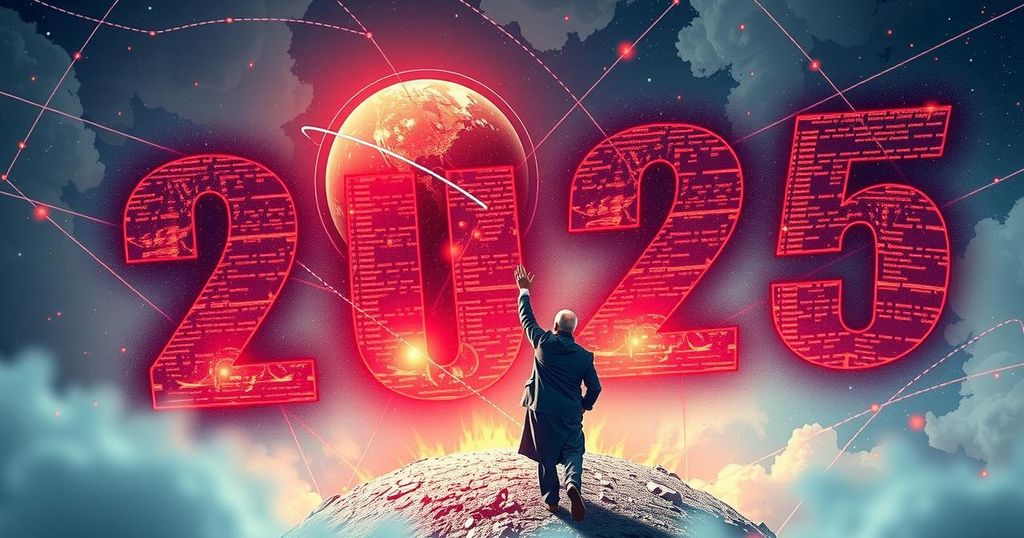What Lies Ahead for Democracy Following 2024 Elections: A Global Perspective

2024 marked a historic election year for major democracies, with over 2 billion voters participating in critical elections amid global challenges. Key leaders such as Trump in the U.S. and Modi in India face pressing issues like immigration and economic inequities. Other leaders, including Ramaphosa, Macron, and Sheinbaum, contend with complex political landscapes requiring careful navigation and innovative policies in 2025.
Following a year marked by significant electoral activity in many of the world’s largest democracies, the future of governance and democracy in 2025 remains a matter of critical importance. A record-breaking 2 billion individuals participated in elections across various nations, including Taiwan and the United States, amidst ongoing geopolitical tensions and economic challenges stemming from conflicts like the war in Ukraine and trade disputes between the United States and China.
In the United States, President Donald Trump’s victory in November 2024 signifies a notable political turnaround. His first day in office is poised to set the stage for his administration to rollback previous immigration policies, emphasizing stronger border enforcement measures. Trump plans to issue over 25 executive orders focused on policies regarding migration and energy, which will likely lead to significant changes immediately.
India, on the other hand, faces pressing challenges despite Prime Minister Narendra Modi’s re-election. His government has a diminishing mandate and must confront high rates of unemployment and rising inflation, which could affect economic inclusivity. Modi’s promises to create jobs have not met expectations, necessitating urgent action to address the aspirations of a burgeoning youth population.
In South Africa, President Cyril Ramaphosa’s re-election follows dissatisfaction with the African National Congress’s (ANC) prolonged leadership. The ANC garnered only 40% of the vote, prompting a coalition with former rivals. Ramaphosa is tasked with revitalizing a struggling economy plagued by unemployment and energy shortages, particularly affecting the youth.
France’s political landscape was dramatically affected by Emmanuel Macron’s snap election, resulting in a fragmented parliament. This electoral outcome could impede economic recovery and leave marginalized groups vulnerable, especially amidst political uncertainty in Germany, where Chancellor Olaf Scholz’s government recently faced a loss of confidence.
Lastly, Claudia Sheinbaum’s inauguration as Mexico’s first female president brings the challenge of balancing progressive promises, including women’s rights and environmental objectives, with the pressures of a significant budget deficit and migrant issues exacerbated by changing U.S. immigration policies.
In summary, these global democracies face a multitude of interconnected challenges that will require strategic governance and responsive policies in the coming year. The outcomes of their elections will significantly impact the socio-political landscape and the broader context of international relations moving forward.
The context of this analysis lies in the electoral outcomes of several key democracies that collectively house nearly half of the world’s population. The year 2024 saw record voter turnout, as citizens engaged in decisions that will shape the political and economic fabric of these nations for years to come. Critical issues such as immigration, economic disparity, and social justice are emerging as focal points for newly elected leaders. Understanding these dynamics is essential for anticipating future governance challenges and addressing public concerns in these diverse countries.
The recent elections across various major democracies signal a pivotal moment in shaping domestic and foreign policies. Leaders such as Donald Trump in the U.S., Narendra Modi in India, Cyril Ramaphosa in South Africa, Emmanuel Macron in France, and Claudia Sheinbaum in Mexico are faced with significant challenges that will test their governance abilities. As they navigate economic woes, social disparities, and geopolitical tensions, their strategies will undoubtedly impact both national and international landscapes going into 2025.
Original Source: www.context.news







